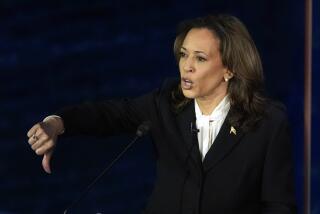68% Vote on Reforms, Poland Says : Higher Prices for Staples, More Free Enterprise at Issue
WARSAW â More than 17 million Poles turned out to vote on questions of economic and political reform Sunday in the first national referendum in this country since Communists came to power here 41 years ago.
Government spokesman Jerzy Urban said that by the time polling places closed at 10 p.m., 68% of the nationâs 26.8 million voters had gone to the polls. Final results are expected today.
Dissidents staged protests in at least four cities in an effort to induce citizens to boycott the referendum. But government officials viewed the turnout as an endorsement of its reform proposals.
Government spokesman Jerzy Urban said the government âthanks those who voted and supported the program of the reforms.â But he warned that a âvictoryâ in the referendum âdoes not mean a victory of the reforms in practiceâ unless they are implemented.
Premier Zbigniew Messner, in response to reportersâ questions after he voted, said he saw the vote as the start of radical economic reform in Poland.
Calls for a âCommon Effortâ
âRadical changes call for a common effort by us all, and everyone should voice his opinion on this matter,â he said.
Polandâs leader, Gen. Wojciech Jaruzelski, accompanied by his wife, Barbara, voted at a museum near his modest home in southern Warsaw.
The government has been urging voters to approve the two economic and political reform measures on the ballot. The economic package would include higher prices for most basic goods, with staple food products such as meat, milk and sugar slated to rise by 110%.
The reforms also would give state enterprises more autonomy and responsibility, increase the role of private enterprise and streamline government ministries.
By law, a simple majority of eligible voters must approve the questions for the outcome to be binding.
Polandâs last referendum was on June 30, 1946, and was linked to the consolidation of power in Poland by the Communists after the Soviet Red Army drove out the Nazis in World War II.
Widespread Opposition
Despite the official expressions of optimism, there was widespread opposition to the reforms, and the voting was lighter than in 1985 when parliamentary elections drew 80% of voters.
In Warsaw, after a pro-Solidarity Mass at St. Stanislaw Kostka Church attended by more than 5,000 people, about 1,500 people carrying union banners tried to march to a nearby square before their route was blocked by a column of police. The protesters chanted, âBolsheviks to the morgue!â--which rhymes in Polish.
âThis is our referendum!â and âEnough price hikes!â were other chants voiced by the crowd. At least one person was seen being arrested.
At the Mass, Father Tadeusz Sitek drew cheers when he declared that people should hold a âspiritual referendumâ that would âreturn to our homeland freedom and independence.â
Many people at the church said they would not vote.
âWhat for?â said one retiree who identified herself only as Mrs. Sosabowski. âTheyâre the same people who made this mess over the last 40 years, and now they say they can change it?â
Polling Aide âVery Pleasedâ
But at a polling station near the Warsaw steelworks, a polling official said around noon he was âvery pleasedâ with the turnout.
âThe quicker we act, the better weâll get out of the pit,â said Anna Dybek, who voted in favor of economic reform.
Earlier in Warsaw, about 400 people marched peacefully to a monument in honor of patriots who rebelled against the Russian czar on Nov. 29, 1831. And two student soccer teams mocked the referendum by staging a match between âPovertyâ and âProsperityâ--until the game was called off by police.
Dissident source said about 3,000 protesters chanting, âSolidarity, Solidarity,â and, âIf you want to starve, go vote,â left a Mass at St. Brigidaâs Church in the Baltic port of Gdansk, long a focal point for anti-government protests, to march through the city where the now outlawed Solidarity trade union movement was born in 1980.
Riot police using truncheons battled the marchers. They struck back with umbrellas, the sources said. Urban denied that police had attacked marchers and said that only two people were held for hurling stones at police. Dissident sources said 10 people were detained.
Solidarity founder Lech Walesa had dismissed the election as propaganda and said he was staying home at his apartment in Gdansk. The countryâs powerful Roman Catholic church did not take a stand on the referendum.
In the southern city of Krakow, about 400 people attended a rally sponsored by the illegal political party KPN, the Confederation for an Independent Poland, and the groupâs leader, Ryszard Bocian, was detained twice and released, sources said.
Another group of six people were detained for holding a banner on a roof in front of the U.S. Consulate in Krakow that said, âOur Vote in the Referendum: Communists to Madagascar,â the dissidents said.
In the Krakow suburb of Nowa Huta, about 500 people left a Mass and staged a short march to a polling station, dispersing of their own accord, activists reported.
In the southwestern city of Wroclaw, about 200 anti-government protesters rallied outside a church and handed out leaflets before dispersing.
Despite nearly two weeks of instructions on Polish evening television and in the official media, some older citizens appeared confused about how to vote.
Urban also said the ballot was badly designed.
More to Read
Sign up for Essential California
The most important California stories and recommendations in your inbox every morning.
You may occasionally receive promotional content from the Los Angeles Times.










